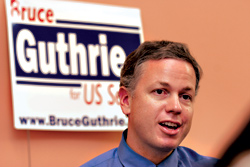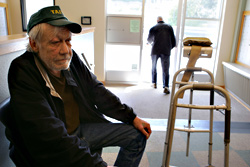There’s an ugly fight in the Rainier Valley over proposed permanent housing for 80 homeless Seattleites. Residents of the Columbia City and Hillman City neighborhoods—as culturally diverse a stretch as there is in Seattle—are challenging the Downtown Emergency Service Center (DESC), which provides housing and social services to the homeless. In a weird way, it pits residents of the area against their own professed social values of inclusiveness and diversity.
DESC is proposing to build apartments for homeless people with mental illnesses on a blackberry-clogged lot a few blocks south of the Columbia City business strip. In the windows of New Freedom Hall a couple of blocks north, signs read, “No One Is Illegal” and “Support Immigrant Rights.” While the neighborhood embraces such outward displays of social progressivism, some residents are sending e-mails to city officials and the media castigating the project as housing for sexual predators and criminals. Which it’s not.
At a very heated public meeting Thursday, May 4, organized by state Sen. Adam Kline, D-Seattle, residents lit into DESC’s executive director, Bill Hobson. The project is designed to address the precepts of the Seattle area’s 10-year plan to end homelessness (see “Plan to Nowhere?” March 8): permanent housing for the homeless instead of a mat on the floor of a traditional shelter, along with social services on-site. A permanent home with services is seen as the way to end the homeless population’s common cycle of sleeping in the streets, hospital ERs, jails, and shelters. The DESC proposal, known as the 5270 Project for its Rainier Avenue South address, would be one of several in the Seattle area. Experts estimate as many as 50 percent of the homeless have a mental illness of some kind.
Area residents weren’t up for listening to Hobson or Kline, who said he was trying to “avoid a harassing situation” for DESC. “Come back to the community when you do it right,” said Ray Akers, a real-estate agent who said he had questions about the funding application to the city.
Another resident, who identified herself as a social worker at Harborview Medical Center, said she had concerns about the people the project would serve. Most of the 100 attendees seemed stuck on unenlightened assumptions about mental illness: People wandering neighborhoods and molesting children. Drug dealing. Drinking. Erosion of property values. They spoke of it as if it were the same facility as DESC’s experimental 1811 Eastlake project, where chronic street drunks are housed and allowed to consume alcohol.
Of course, in Capitol Hill and Belltown, where similar facilities are situated, property values have surged at double-digit rates in recent years. And not all residents are dead-set against the DESC facility. “If we are really about community, we have to be inclusive about what that means,” says Bob Barnes, a longtime area resident and local political organizer. Noting that most speaking against the project were white in an area brimming with ethnic minorities, he adds, “That doesn’t just mean white folks with lots of money coming in because they can buy cheap houses.” Barnes says he was flabbergasted by the behavior of his neighbors.
Jonathan Rosenblum, an area resident, says it bothered him how deeply the stigma of mental illness still runs in America. “A lot of people seem to be reacting out of a sense of fear and fear of the unknown, and I hope those folks who feel that way take a closer look at their own values and [at] who are we talking about here,” he says.
Slated to open in 2008, the 5270 Project needs about $4 million from the city’s housing levy and money from the state’s housing trust fund. The city’s Office of Housing will make a decision on levy funding in early June, according to Adrian Quinn, the city’s housing director. She says that DESC has played by the city’s rules in terms of notifying area residents and holding outreach meetings.
Opponents ofthe project announced after the meeting that they would continue to organize against the DESC apartments.







